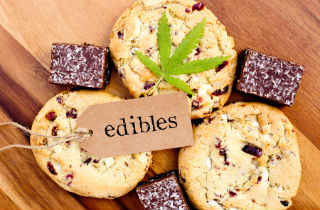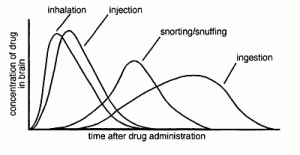Yes. You get high when you eat marijuana. But it usually takes longer and is not as intense as inhaling marijuana smoke. But the high lasts longer, and is highly detectable in urine after eating it.
Marijuana is usually smoked in a pipe or cigarette but can also be mixed in baked goods and ingested orally as a pill or capsule (dronabinol or oral THC). Weed and brain damage effects are currently be investigated by scientists, and may be equally damaging after chronic use whether you are smoking or eating marijuana. Here, we present information on bioavailability of eaten marijuana, issues in drug testing, as well as how to quite marijuana if you think that you have a problem. Please feel free to ask your questions about weed below. We’ll be happy to respond with a personal answer ASAP.
Marijuana bioavailability
Bioavailability is the the degree and rate that drugs like marijuana are absorbed into the body or are made available at the site of physiological activity. The bioavailability of marijuana is different when you eat it versus when you smoke it. In other words, how fast, how long, and how intensely you feel the effects of marijuana depend on how you use it. There are three main points that we’d like to explain here about HOW marijuana administration affects euphoric sensation (the feeling of being high).
1. Onset – If you breathe in marijuana smoke, euphoric effects occur within seconds or minutes of inhalation (although smoking weed and lung damage risk increases). If you eat foods containing weed, effects occur after a longer period of time (30 -60 minutes) because delta-9-tetrahydrocannabinol (THC) must first be metabolized by the digestive system.
2. Length – If you eat marijuana, the duration of euphoric effect (feeling high) tends to last longer than if you inhale marijuana smoke, although the intensity may be less.
3. Drug testing – Eating weed increases amounts of cannabinoids in urine, making drug detection more likely.
Why it takes longer to get high when you eat weed
When cannabis is ingested by mouth, there is a low (6%–20%) and variable oral bioavailability. Why does this happen? Well, basically, bioavailability of cannabinoids is reduced after oral ingestion due to extensive first pass metabolism. Orally administered drugs must pass through the intestinal wall and then are metabolized by the liver before they reach systemic circulation. And it is this process of slower absorption into the bloodstream that is associated with more delayed peak levels of THC in the body.
By contrast, inhaled marijuana smoke bypasses the body’s digestive system and therefore the effects are more intense and occur more rapidly than oral ingestion. When inhaled, cannabinoids enter the bloodstream quickly from the lungs to the left side of the heart, where they enter the arterial circulation that carries them to the brain. When inhaled, cannabinoids like THC reach a peak concentration in 2 to 10 minutes, declining rapidly for a period of 30 minutes and with less generation of the psychoactive 11-OH metabolite.
Eating weed decreases your high, but it lasts longer
Peak plasma concentrations of THC occur 1 to 6 hours after you orally ingest marijuana and remain elevated with a terminal half-life of 20 to 30 hours. So not only do cannabinoids take longer to act, but the body begins to metabolize them before they can act on the brain. Enzymes in the stomach, intestines, and liver begin breaking down the drugs so they can be cleared from the body. Therefore, eating weed results in lower THC concentrations than after inhaling marijuana smoke.
Still, some cannabinoids do not lose their potency as a result of being ingested. Dronabinol and THC-COOH are present in equal concentrations in plasma and concentrations peak at approximately 2-4 hours after either oral or inhaled smoke dosing.
Is eating weed more risky on drug tests?
Yes. Oral ingestion of marijuana in cooked brownies during clinical trials has led to excretion of highly concentrated amounts of cannabinoid in urine. Although marijuana smokers can potentially measure and adjust the balance of weed effect and thus their amount of marijuana exposure, the effects of oral ingestion of marijuana are slow in onset and do not allow you to adjust dosage. Therefore, the amounts of 9-carboxy-THC in urine after oral ingestion were, at times, substantially higher than those observed after smoking equivalent doses.
Do you have a problem with weed?
If you think that you have a problem with weed, you probably do. If you want to cut back your weed intake, or stop taking weed completely…there are people and programs that can help you. Please let us know by email or here in a comment if we can help you find treatment for weed problems. We’ve been there and you are not alone!










Related Posts